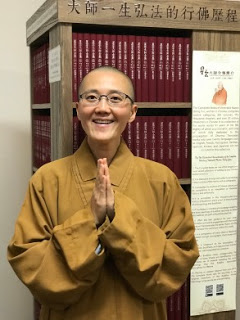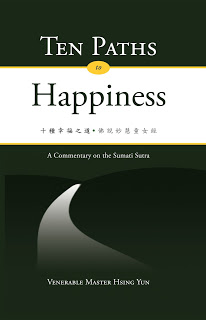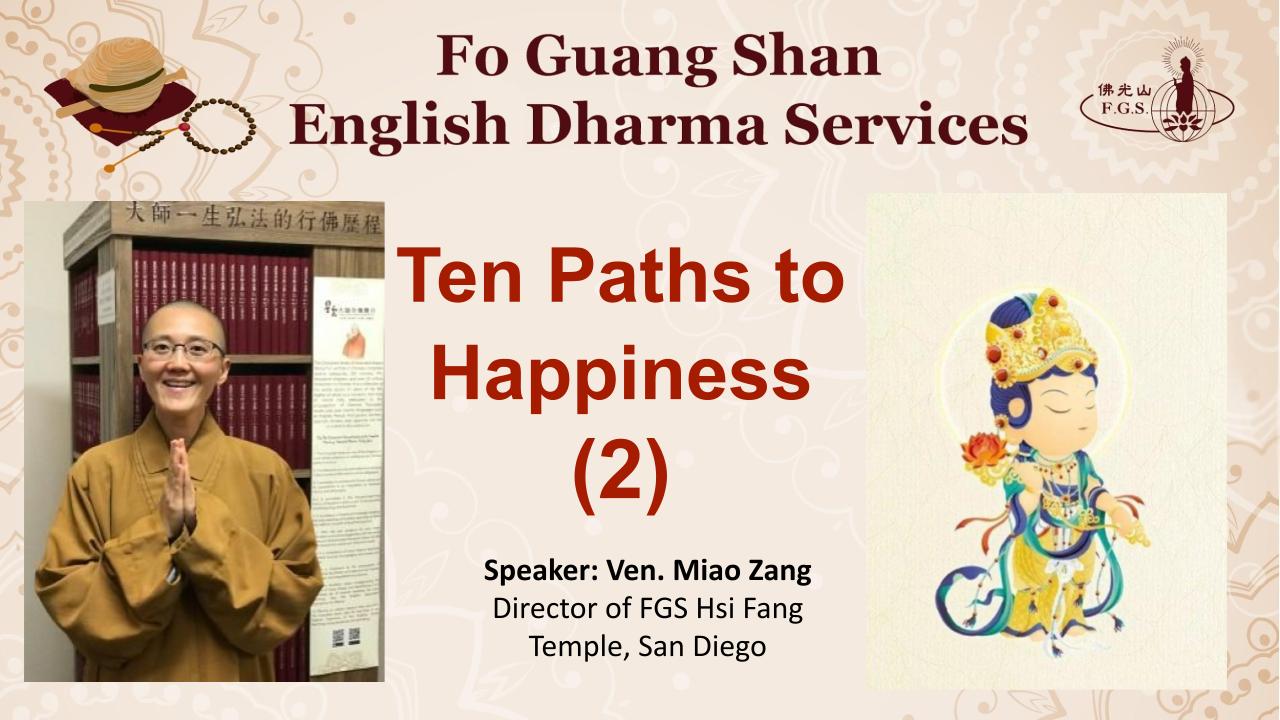
Speaker: Venerable Miaozang
FGS Hsi Fang Temple, San Diego
I. Introduction
Auspicious greetings to all Dharma friends around the world. Thank you for tuning in to a new series of Fo Guang Shan English Dharma Services. My name is Miaozang, from Fo Guang Shan Hsi Fang Temple, San Diego, California. Thank you for joining me again for the second session in the pursuit of Ten Paths to Happiness.
In the last session, we learned the ways on how (1) not to give rise to anger when dealing with unwholesome friends, (2) tranquilly abide with great loving-kindness, (3) taking deep joy in the true Dharma, and (4) making Buddha images as the four methods suggested by the Buddha in attaining elegant and proper form.
Today, I will continue to share the Buddha’s wisdom to today’s applications on how to have perfect wealth and maintaining harmony in our society as the second and third path to happiness.
II. The Second Path to Happiness
In the Sumati Sutra, Sumati continued to asked the Buddha, “How is a life of perfect wealth attained?”
Buddha replied: “Sumati, bodhisattvas use four methods to obtain wealth and nobility. What four?
- First, give timely gifts.
- Second, give without a contempt or arrogance.
- Third, give joyfully.
- Fourth, give with no expectation of reward.”
Wealth is something that most of us would like to have and it is concerning the success of this life. And yet, many people thought that Buddhists should not pursue wealth and should only be concerned with enlightenment. Is that true? Well, this sutra discusses both worldly and supramundane wealth and needs. Not only that, we need to have the right understanding that the dukkha (unsatisfactoriness) arises is not because of wealth but because of our endless greed and craving to have more. The Buddha guides us in understanding the causes, conditions, and effects in obtaining wealth in this sutra.
Most of us find it hard to earn a living and some cannot help but complain about others who are better off with resources and things seem to come easily. Why can they have these things? Where do all these good conditions and effects come from? All the good conditions and rewards don’t just come like that nor can be forcibly taken or through wishful praying. Of course, the Buddha wants us to understand the causes we had created and to embrace the effects. So, the questions to ask ourselves, have we sown the seeds of rewards and blessings? If we haven’t sown the seeds, what will we harvest? Do we cultivate wholesome affinities and connections with others? If not, how would we expect something out of nothing?… Thus, there is a Buddhist saying, “When one gives, one will receive” or in other words, what we sow is what we reap. If we cultivate the wholesome causes of giving and sharing, eventually, when the conditions are ready, one will receive the wholesome effects. Therefore, in the second path to happiness, the Buddha shared with us the four methods, give timely gifts, giving without contempt or arrogance, giving joyfully, and giving without expectation of reward. What is giving?
1) Give Timely Gifts
Giving is the most wonderful action in making affinities with others and timeliness in giving is crucial in making sure that things or help is being given at the right time. Venerable Master said: “The greatest wealth in the world is understanding how to give to others. The greatest poverty is greedily coveting what others have.” When it comes to giving, one not only gives wealth. Other ways of giving are speaking wholesome words, expressing gratitude, and serving others. The Buddhist concept of giving also includes sharing of the Dharma and giving fearlessness. We might be familiar with giving wealth, which is to offer physical support to others. However, not many people know the other two types of giving, sharing of Dharma, and giving fearlessness. Sharing of Dharma is referring to using knowledge, skills, and truth to help others. Giving fearlessness is to let others feel safe with righteous acts, eliminating cruelty and ensuring peace in society, and offering spiritual comfort to all sentient beings.
Taking a look at the timeliness in giving and sharing. It sets our compassion in action. The Buddha taught us to care for the now. Once we set our intention, we should put our plans into action. We will be more mindful and observant of everyone around us. When we see someone being scolded, take the initiative. Comfort and encourage one promptly.
There was one time when a devotee by the name John was on the way to the Coronado Island. Halfway driving through the bridge, he saw a lady standing there and staring blankly to the ocean. He stopped the car without hesitation. Getting off the car, he walked towards the lady and started to talk to her. He just realized that she was thinking of committing suicide. John did not show any signs of panic but continue talking to her, sharing with her stories of how Ven. Master overcoming all the difficulties in his life. There are no good or bad happenings in life but it is a way for us to gain more experience in life and to grow stronger from each encounter. They talked for almost an hour. After hearing what John said as if the light bulb in her mind just lit. She then understood the importance of life and there is always hope for changes. She dropped the idea of ending her life. John’s timely giving and compassion in action saved her life. Timely giving saves us from regrets in life too. Imagine if he were to just drive by. What would have happened to this lady? Do we have similar experiences in life? Thus, give timely gift is one of the perfect wealth in life.
2) How We Give
How do we give? The Buddha shared with us when we give, we should give without contempt or arrogance, giving joyfully, and giving with no expectation of reward. Sometimes, it is easy to give, but to do so without any attachment to “I” might not be that easy. So, we need to remember how we give. Ven. Master said, “Generosity is not about how much is given, but instead on the sincerity of the intention.” When we give, we should not obsess over matters such as having versus lacking, rich versus poor, or superior versus inferior. When we receive, we should be grateful and appreciative.
Just like the story that Ven. Master once shared about a lady named Mila, who was homeless and begged for a living. One day, Mila went begging for food. As she walked past a temple, a Dharma service was ongoing. She saw many people making all kinds of offerings and inspired her to offer too. However, she felt disappointed as she did not have anything to offer. While she was feeling that, she put her hand in her pocket, to her surprise, she found something – a penny. Happily, she walked into the temple. Standing in front of the Buddha, she knelt and prayed. When she was finished, she took out her only penny and dropped it into the donation box. As Mila was leaving the shrine, a monk stopped her and said, “Excuse me, could you please wait? Our Abbot would like to meet you.” To Mila’s surprise, the Abbot prayed for her and her family personally. Equally touched and baffled, Mila said to the Abbot, “Thank you so much. You didn’t have to do all that for me, I’m just a beggar with nothing.”
The Abbot replied, “You gave everything you had, I see before me a sincere person with a good heart.” Mila left the temple feeling grateful and fulfilled. From that day on, though she continued to be a beggar, she felt different, more at peace with herself.
A few months later, the whole nation was in mourning as the queen had passed away. The King was inconsolable and the royal ministers suggested an outing to ease his sadness. When they were in a forest, from afar they saw a beam of light shining on a tree. As they got closer, they discovered that the light shone Mila, who was sitting in meditation. Despite her ragged appearance, beauty flowed from her. When the King heard about Mila, he decided to bring her back to the palace and gave her lodgings. Feeling very grateful, Mila would spend her time comforting the King with stories. As the months passed, the King fell in love with her and decided to marry her and crown her as the queen.
After becoming the queen, Mila was reflecting on her life’s journey. She suddenly remembered her offering to the temple. The next day, she proposed to the king that she would go make an offering to the temple. She took ten wagons of offerings to the temple. She was waiting for the Abbot to come and pray for her. But to her surprise, she was greeted by a monk. She was irritated. Then, the humble monk said, “I am very sorry, your majesty, our Abbot would like me to send this message to you. In the past, you were a beggar, a penny was all you had. You offered it with great sincerity. That kind of offering is worth more than anything. However, today, even though you came with ten wagons of offerings, you have also brought along your arrogance.”
Venerable Master concluded in this story with a verse, “Contented people are rich. Greedy people are poor. Those who help are noble. Those who desire much are degraded.” Therefore, when we give, we learn to give and share with sincerity. We should not give with arrogance nor with the desire that others remember and repay us. This is perfection in giving.
II. The Third Path to Happiness
On the third path to happiness in maintaining harmony in the family, the Buddha said:
“Sumati, bodhisattvas use four methods to keep their families from destruction. What are the four?
- First, skillfully abandon divisive language.
- Second, persuade sentient beings marred by the wrong view to abide in the right view.
- Third, protect and ensure the continuation of the true Dharma.
- Fourth, teach all sentient beings to attain Buddhahood.”
Family is built on respect, trust, and love. The people closest to us in the world are our family members. Family members are always our support and often a haven to talk about one’s successes, setbacks, gains, and losses. The wider concept of family is not limited to people with blood relationship but can be extended well into the community. However, we all have differences and personalities. How do we maintain connected and harmony?
1) Skillfully Abandon Divisive Language
We should skillfully abandon divisive language. What is divisive language? They are words that are said in a two-faced and judgmental way. Sometimes, we might come across people who try to drive a wedge between others and instigate conflict between groups or friends, spreading vicious rumors on both sides. We should avoid doing so at all costs.
There was a story about Rahula, a young disciple and the son of the Buddha, was speaking a divisive language to those who would like to pay respect to the Buddha. If the Buddha was in the East, he would have told others, the Buddha was in the West and vice versa. People would be going to the wrong direction and could not find the Buddha. Eventually, the Buddha knew about that and disciplined him, saying,
“Whenever you want to perform a verbal act, you should reflect on it:’This verbal act I want to perform — would it lead to self-affliction, to the affliction of others, or to both? Is it an unskillful verbal act, with painful consequences, painful results?’ If, on reflection, you know that it would lead to self-affliction, to the affliction of others, or to both; it would be an unskillful verbal act with painful consequences, painful results, then any verbal act of that sort is absolutely unfit for you to do.”
If we can’t control our mouth, how would we be able to control our mind? There are five conditions to contemplate before speaking:
“Do I speak at the right time, or not?
“Do I speak of facts, or not?
“Do I speak gently or harshly?
“Do I speak beneficial words or not?
“Do I speak with a kind heart, or inwardly malicious?”
When we can contemplate the above, our words are not only true, comforting, magnanimous, also carefully said and with wisdom. Then, harmony in families will not be impossible.
2) Right View and Harmony
Another method in maintaining harmony is to have the right view. With the right view, we can see the world correctly and have a proper understanding of causes and conditions in all matters in life. We will see the cause and effect of everything that comes together and fall apart. Without the right view, people will lack reasoning, and often blame others whenever there are obstacles in life. They often confuse right and wrong and arrogantly believe they are right.
The Buddha once said: “In a person of wrong view, wrong thought comes into being. In a person of wrong thought, wrong speech. In a person of wrong speech, wrong action. In a person of wrong action, wrong livelihood. In a person of wrong livelihood, wrong effort. In a person of wrong effort, wrong mindfulness. In a person of wrong mindfulness, wrong concentration. In a person of wrong concentration, wrong knowledge. In a person of wrong knowledge, wrong release. This is how from wrongness comes failure, not a success.”
If everyone in a family can engage in the right thoughts, having the right beliefs, and get along with all other family members and friends, then that household will be in harmony. The society will be without conflicts and the world will be at peace. Don’t we think that having the right view and true Dharma is crucial?
IV. Conclusion
To end today’s session, to have perfect wealth, let us give and share with others promptly, and without arrogance. To maintain harmony, let us abandon the divisive language and have the right views.
Next week, we will be discussing on the fourth and fifth path to happiness on how to be born in the presence of a Buddha and traveling freely without obstructions in mind.
If you are interested in reading more on the Ten Paths to Happiness, you may get a copy from our Buddha’s Light Publications.
Let us conclude this lecture by joining our palms, and dedicating the merits from this session to our family, our friends, our society, and all beings. Last but not least, thank you for joining us in today’s session. If you find this lecture series helpful to your practice, please subscribe to the FGS English Dharma Services Youtube Channel and share it with your friends. See you next week. Omituofo.
Ten Paths to Happiness: A Commentary of the Sumati Sutra

By: Venerable Master Hsing Yun
Published by: Buddha’s Light Publications
We all want to be happy. Twenty-six hundred years ago a young girl named Sumati asked the Buddha ten earnest questions on how to live happily in this life and beyond, with the Buddha’s detailed responses revealing that happiness can only be attained when we understand the nature of the world and practice for the benefit of others. In Ten Paths to Happiness, Venerable master Hsing Yun explicates these precious teachings and presents the path to lasting happiness to all who wish for peace, harmony, equality, and liberation from suffering in this life.
Click here for more information.

